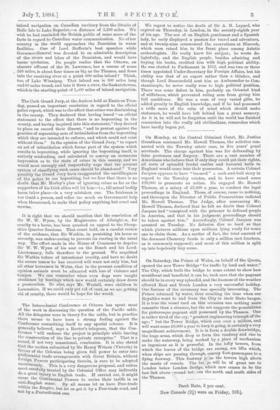We regret to notice the death of Sir A. H.
Layard, who expired on Thursday, in London, in the seventy-eighth year of his age. The son of an English gentleman and a Spanish lady, he early displayed a passion for travel and adventure, and at twenty-nine commenced the excavations at Nineveh, which soon raised him to the front place among Asiatic archaeologists. He really knew his subject; he wrote de- lightfully, and the English people, besides admiring and buying his books, credited him with high political ability. He was elected to Parliament in 1852, and was two or three times appointed Under-Secretary for Foreign Affairs, but his ability was that of an expert rather than a •thinker, and though Lord Beaconsfield sent him as Ambassador to Con- stantinople, he never really rose to high political position. There was some defect in him, probably an Oriental kind of wilfulness, which prevented ruling men from giving him full confidence. He was a man of very varied gifts, he added greatly to English knowledge, and if he had possessed a trifle more of the calm of mind which should make statesmen, he would have left behind him a great memory. As it is, he will not be forgotten until the world has finished researches into the really old civilisations, researches which have hardly begun yet.










































 Previous page
Previous page